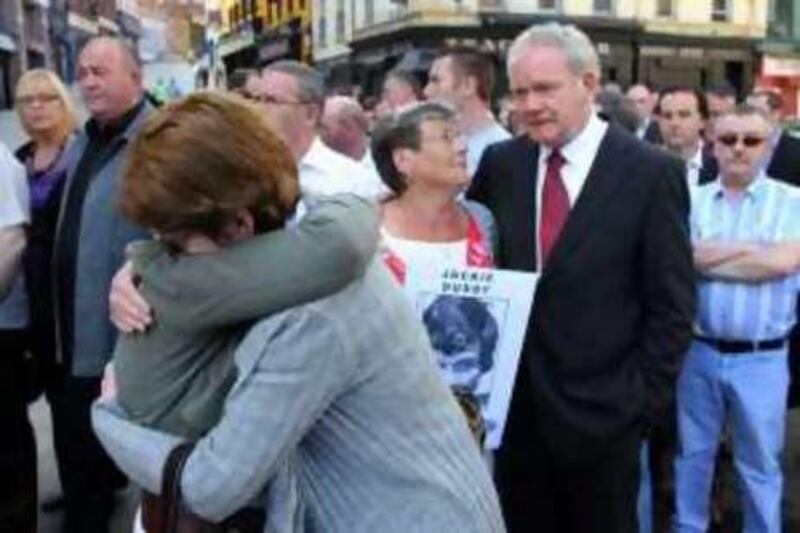LONDON // The killing by British soldiers of 14 Irish nationalist demonstrators on Bloody Sunday in 1972 was "both unjustified and unjustifiable", the prime minister David Cameron said yesterday. He told MPs that the longest and most expensive judicial inquiry in UK history had found that the order to send members of the Parachute Regiment into the Bogside area of Londonderry in Northern Ireland "should not have been given".
The inquiry, chaired over the past 12 years by Lord Saville, found that 13 people had died and another 15 were wounded because soldiers "lost their self control". None of those shot were armed, no warning was given and half of those who died were teenagers. "It was wrong," Mr Cameron said. "I am deeply, deeply sorry." Family members of those who died gathered yesterday at the Guildhall in Londonderry, the intended destination of the protest marchers on Bloody Sunday. They cheered as Mr Cameron spoke.
The events of January 30, 1972, have been a festering sore in relations between the Roman Catholic and Protestant communities for almost four decades. Across the world, the killings caused outrage. They marked the end of the non-violent campaign for civil rights in Northern Ireland and led to a dramatic upsurge in terrorist recruits to the Irish Republican Army (IRA) and a consequent increase in the violence that, in 30 years of "the troubles", was to claim more than 3,500 lives. A month after Bloody Sunday, the IRA bombed Aldershot Barracks in southern England, killing six people, five of them women. The following month, the Stormont parliament which had ruled Northern Ireland since its creation in the 1920s was suspended and direct rule from London was imposed. Soldiers involved in the day's tragedy have always claimed that they began firing only after they themselves had been shot at. But the Saville Inquiry, which started taking evidence in 1998 after most paramilitaries had finally laid down their arms, found that "on balance" this claim was probably untrue and that it was the British who fired first. The bloody events unfolded as about 10,000 people took part in a march organised by the Northern Ireland Civil Rights Association through the predominantly Catholic area of Derry. Soldiers ordered to stop the march, which was banned under prevailing legislation, became the targets of stones, bottles and other missiles. They then pursued the marchers into the Bogside. The inquiry said that the order for the soldiers to go into the area "should not have been given" by their commanding officer, Lt Col Derek Wilford, as it contravened instructions given to him by a superior officer. It concluded that none of those killed or injured had been carrying firearms. While republican paramilitaries had fired on the soldiers, "none of this firing provided any justification for the shooting of civilian casualties," said the inquiry's final report. Soldiers "reacted by losing their self-control - forgetting or ignoring their instructions and training". The result was a "serious and widespread loss of fire discipline". In the aftermath of the killings, Lord Saville found that many of the soldiers involved "knowingly put forward false accounts in order to seek to justify their firing". The inquiry found that some of those who were killed or injured were clearly fleeing or going to the assistance of others who were dying. "Despite the contrary evidence given by soldiers, we have concluded that none of them fired in response to attacks or threatened attacks by nail or petrol bombers," said the report. It added that one person was shot while "crawling away from the soldiers" and another was probably shot "when he was lying mortally wounded on the ground". Mr Cameron told MPs: "These are shocking conclusions to read and shocking words to have to say. But you do not defend the British army by defending the indefensible. There is no point trying to soften or equivocate what is in the report. It is clear from the tribunal's authoritative conclusions that the events of Bloody Sunday were in no way justified." Tony Doherty, whose father Paddy was fatally injured, told them that the Saville Inquiry had finally vindicated the victims and disgraced the soldiers. "It can now be proclaimed to the world that the dead and the wounded of Bloody Sunday, civil rights marchers one and all, were innocent one and all, gunned down on their own streets by soldiers who had been given to believe that they could kill with perfect impunity," he said. "It was the paratroopers' mission in Derry to massacre. Bloody Sunday wounded Derry very, very badly. We may hope that from today we can begin to bind those wounds." Thousands of people, who had gathered at the Guildhall to watch Mr Cameron's statement to parliament on a giant TV screen, cheered Mr Doherty's comments. It will now be up to Northern Ireland's Public Prosecution Service (PPS) and the province's chief constable, Matt Baggott, to decide if there should now be a criminal investigation into Bloody Sunday and any charges of unlawful killing - something that lawyers believe will be almost impossible after nearly 40 years. The Saville Inquiry took witness statements from hundreds of people. When it was established 12 years ago by Tony Blair, it was expected to cost £11 million (Dh60m) to stage. In the end, it cost £195 million, more than half of which was spent on lawyers' fees. dsapsted@thenational.ae






